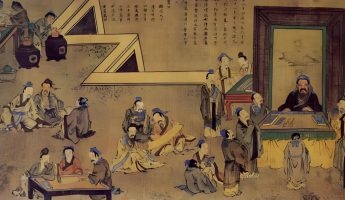As a treasure of ancient Chinese philosophy, the Tao Te Ching has profound and extensive ideas, covering various aspects such as cosmology, philosophy of life, and political views. The following is an interpretation of the core ideas of the Tao Te Ching:
1、 The core position of Dao
Definition of Dao: Laozi first systematically expounded the concept of “Dao” in the Tao Te Ching, believing that Dao is the origin and fundamental law of all things in the universe. The Dao is intangible and formless, transcending all concrete things, but also inherent in all things, driving the development and change of all things.
The characteristics of Dao include the presence or absence of props, naturalness, and non action. Nothingness is not emptiness, but refers to the intangible and formless nature of the Tao, transcending all specific regulations; Nature emphasizes that the Tao conforms to the nature of all things and does not intervene; Wuwei refers to the way, in promoting the development of all things, not forcibly taking action, but allowing all things to grow naturally.
2、 Dialectical thinking
Existence and non existence are interdependent and transform each other, according to Laozi. Being born into nothingness and returning to nothingness; Nothing contains existence, and existence hides nothingness. This kind of thinking reveals the dialectical unity between things.
The movement of the opposite way: Laozi emphasized the principle that when things reach their extreme, they will reverse, and when they reach their peak, they will decline. He believes that when things develop to a certain extent, they will inevitably transform in the opposite direction. This kind of thinking embodies profound dialectical thinking, requiring people to look at problems comprehensively and objectively, avoiding one sidedness and absolutism.
3、 Life wisdom
The highest good is like water: Laozi used water to metaphorically describe the highest good. Water is good at nourishing all things without competing with them, staying in places that no one likes, so it is closest to the “Dao”. This kind of thinking inspires people to be humble, tolerant, selfless, and use softness to overcome hardness.
Satisfaction brings happiness: Laozi believed that only those who are content can always feel happy. He opposes excessive desires and greed, advocating for maintaining inner peace and satisfaction. This kind of thinking has important enlightening significance for people who pursue material enjoyment in modern society.
4、 Political wisdom
Governance by inaction: Laozi advocates for the implementation of “governance by inaction” in politics, which means that the government should not excessively intervene in social and economic life, and allow the people to develop naturally. He believes that the government should follow the laws of nature and society, allowing all things to grow naturally, rather than acting forcefully. This ideology embodies respect and conformity to nature and society.
Fairness and Justice: Laozi emphasizes the importance of fairness and justice. He believes that the universe and all things in the universe operate according to objective natural laws, and there is no love or hate for all things. Saints governing the world should also follow the way of heaven, treat the people equally and impartially. This ideology has important guiding significance for political construction and social governance in modern society.
5、 Philosophical Reflection
The Universality of Dao: Laozi believed that “Dao” is universally present, not only in the universe and nature, but also in human society and culture. This idea reveals the unity and wholeness of all things in the universe.
The Transcendence of Dao: Laozi emphasizes the transcendence of Dao, believing that it transcends all concrete things and regulations. This kind of thinking inspires people to transcend the constraints of material and sensory limitations, and pursue higher levels of spiritual realm and life values.
In summary, the thoughts of the Tao Te Ching are profound and extensive, covering multiple aspects such as cosmology, outlook on life, and political views. It emphasizes the core position of the Tao, dialectical thinking, life wisdom, political wisdom, and philosophical thinking, providing rich ideological resources and wisdom inspiration for future generations. In modern society, the ideas of the Tao Te Ching still have important practical and guiding significance.



